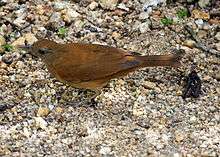Cocoa thrush
The cocoa thrush (Turdus fumigatus) is a resident breeding bird in South America from eastern Colombia south and east to central and eastern Brazil, and on Trinidad and some of the Lesser Antilles.
| Cocoa thrush | |
|---|---|
 | |
| Scientific classification | |
| Kingdom: | Animalia |
| Phylum: | Chordata |
| Class: | Aves |
| Order: | Passeriformes |
| Family: | Turdidae |
| Genus: | Turdus |
| Species: | T. fumigatus |
| Binomial name | |
| Turdus fumigatus Lichtenstein, 1823 | |
The habitat of this large thrush is dense forest. The nest is a lined bulky cup of twigs low in a tree or treefern. Two to three reddish-blotched greenish-blue eggs are laid and incubated by the female for about 13 days to hatching. The young then fledge in another 13–15 days.
The cocoa thrush is 22–24 cm long. It is dark rufous brown above and paler rufous brown below. There are five poorly defined races, differing mainly in the brightness of the plumage. Sexes are similar, but young birds are duller, having the scalloped underparts common in immature thrushes.
The cocoa thrush mainly feeds on or near the ground on insects, especially ants, other invertebrates and some berries. It is a shy species, but on Trinidad it is much tamer, and will come to feeders. The song is a musical warble, and it also produces a variety of typical thrush chuck and chak calls.
Range
In South America, besides the Amazon Basin, the Guianas and the Guiana Shield, the cocoa thrush ranges into two areas.
A medium-sized disjunct population lives on southeast coastal Brazil; the narrow coastal range is 300 km wide and extends from Alagoas state in the north to southern Rio de Janeiro state, about 2300 km. Another range for the species is in northeast Colombia and southwest Venezuela. It covers parts of the headwaters of the Caribbean-flowing Orinoco River drainage, and adjacent Amazonian headwaters to the Rio Negro flowing southeast into the Amazon's northwest quadrant. This Colombian-Venezuelan range extends to the coast, and is coastal along northern Venezuela, as it is an extension of the range from the Guianas, (western Guyana).
The cocoa thrush's range covers the downstream eastern half of the Amazon Basin; in the northeast Basin, it is in Pará and Amapá state with the Guianas. In the southeast Basin, it is in the Tapajos River and Xingu River drainages; also two thirds of the adjacent river system, the lower Araguaia–Tocantins River drainage.
References
- BirdLife International (2012). "Turdus fumigatus". IUCN Red List of Threatened Species. 2012. Retrieved 26 November 2013.CS1 maint: ref=harv (link)
- Thrushes by Clement and Hathaway, ISBN 0-7136-3940-7
- Hilty, Steven L (2003). Birds of Venezuela. London: Christopher Helm. ISBN 0-7136-6418-5.
- ffrench, Richard (1991). A Guide to the Birds of Trinidad and Tobago (2nd ed.). Comstock Publishing. ISBN 0-8014-9792-2.
External links
- Cocoa Thrush on the Internet Bird Collection
- Stamps (for Grenadines of Grenada) incorrect RangeMap
- Cocoa Thrush photo gallery VIREO
- Photo-High Res; Article tsgcs.co.uk
